SEX AND ENDURANCE PERFORMANCE
Martin Pupiš1, Aleksandar Raković2, Danijel Stanković2, Miodrag Kocić2, Vladimir Savanović2
1Mateja Bela, Univerzita Mateja Bela, Banská Bystrica, Slovakia
2Faculty of sport and physical education, University of Nis, Nis, Serbia
Abstract
This work clarifies problems of the perception of sexual activity by long-distance athletes before physical loading. The group that answered a questionnaire comprised 62 race-walkers and long-distance runners from 6 European countries age of 32 years ± 8 years. Questionnaire was composed of 8 closed questions with extra questions. More than 90% of addressed athletes suppose that having a sex 12 hours before endurance performance does not influence it. Immediately after sexual intercourse 40% of athletes have worse feelings during intensive loading. At the aerobic loading it does not change subjects’ feelings or heart rate. Unambiguously we cannot say that having sex before physical loading influences performance positively or negatively.
Key words: sexual intercourse, loading, heart rate, question
INTRODUCTION
Sexual activities immediately before sports competitions have been widely addressed and discussed by athletes and experts in this area but their attitudes towards this topic are diverse. However, sexual activity is a part of everyday life of most people, i.e. athletes. Their attitudes are so different depending on the type of sport that we have determined to tackle this problem in the current paper which is a part of the project VEGA 1/4500/07 (Adaptation to an overload in a year training cycle in athletics and other types of sports).
Similar study was conducted with the American footballers and baseball players showing that American football players restrain from having sexual intercourses before the match, contrary to the baseball players. On the other hand, it turned out that athletes are generally speaking more sexually active than non-athletes (Fisher, 1997).It was also revealed that team sports athletes were more prone to pre-marital sexual intercourse and thus more frequent sexual partners exchange while individual sports athletes were more conservative in this respect. Tracing back the past it is well known that Mohamed Ali avoided sexual activities 6 weeks prior to boxing matches (Fisher, 1997), and even today a lot of couches forbid athletes any sexual activities. However, a footballer player George Best claims that he had had sexual intercourses even during a half time. According to the research of Booneho & Gilomora (1995), published in the Journal of Sports Medicine and Physical Fitness, sexual tercourse should not exert negative influence on sports performance. Following their findings during a sexual intercourse body burns no more than 4 callories per minute, thus totalling 25 callories for the average sexual intercourse. However, a lack of sexual intercourse can result in diminished and disturbed sleeping and consequently psychological anxiety and exhaustion.
Sexsologist Trojan (2006) completely agrees with this finding and claims that an athlete who does not have a sexual intercourse the whole night long but just the evening before the competition and a good night sleep afterwards can not induce bad results. He himself would not recommend sexual intercourse as an ideal warm up activity in the morning before the competition but it would certainly have a positive effect on the results. According to the same author theories of increased competitive condition of sexually inactive contestants are not validated. Competitive sporting spirit could be theoretically connected to the level of testosterone which in turn induces an increase in sporting spirit. However it was found that the level of testosterone is not affected after the sexual intercourse. Two hours after sexual activities a level of prolactine is increased which does not affect sports performance at all (Trojan, 2006). This is in accord with the research of McGlona & Shriera (2000) and Andersona, Weia, & Shyu (2001), who claim that no changes were notices in the athletes results 12, i.e. 48 hours after sexual intercourse. Sports physician Pavol Malovič claims that sexual intercourse is a normal activity the same as when you run up the stairs to the second floor, which corraborates the claim that it can not have negative effects on the results in sport. He adds that sexual activitiy has a vital role and is classified as one of the best rehabilitation activities for the spinal column. It increases the level of the positive hormone - endorfine, inervates pelvis, etc. (Mikulová, 2003). Yet Douglas (2007) does not recommend sexual intercourse immediately before the competition because the ejaculation as he claims induces drowsiness. Also, doctor Boytova has no clear attitude towards this topic but does not recommend sexual intercourse to men immediatelly before the competition, but she does not make an issue of it.
The aim of this research was to investigate the influence of sexual activity on long distance runners before varied types of load.
METHODS
The research was conducted with the long distance runners. A group of subjects was composed of 62 race walkers and long distance runners from 6 European countries aged from 32 ± 8 years,who completed a questionnaire. It was composed of 8 questions with a lot of subquestions. All subjects were elite athletes and one of the research subjects was world champion in athletics. Subjects were given a diary to track all their feelings about sexual relations within 6 weeks.
RESULTS AND DISCUSSION
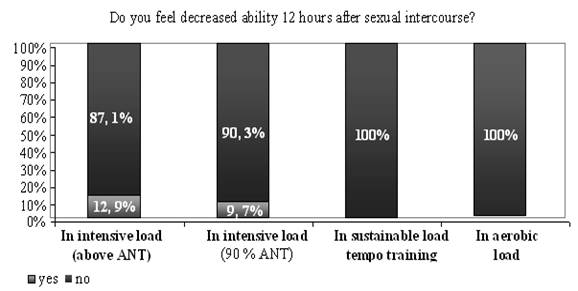
Based on the answers given we have found out that 12,9 % of longdistance runners state that it is correct to refrain from sexual activities just before the competition. On the other hand 87,1 % of long distance runners have the opposite attitude. In relation to a given time interval 9,7 % of long distance runners think that they should not have sexual intercourses 12 hours prior to load and 62,3 % consider any sexual contact 30 minutes before the sustainable load is not recommended. Worse results in the anaerobic load (above the anaerobic threshold) 12 hours after sexual activities are registered in 12,9 % of long distance runners, in loads of 90 % of ANT (anaerobic threshold), 9,7 % reports decreased abilitiy while in loading such as tempo training and the loading of aerobic character we do not register any worse parameter (as can be seen in Graphic 1).
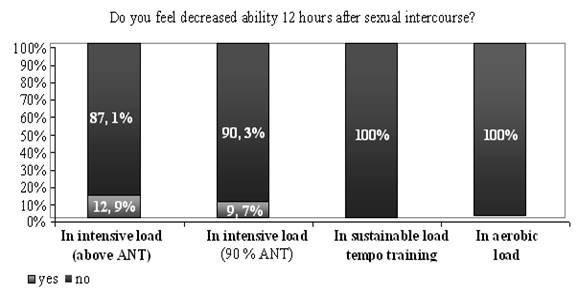
Graphic 1 The effect of sexual intercourse on the sustainable load 12 hours before the various intensity loads
Worse results in the anaerobic load (above the anaerobic threshold) 30 minutes after sexual activities are registered in 40 % of long distance runners, in loads of 90 % of ANT (anaerobic threshold), also 40 % reports decreased ability, while in loading such as tempo training 20 % report decreased ability. In loading of aerobic character we do not register any worse parameter (as can be seen in Graphic 2). One observed long distance runner basically refrains from such activities before the described loads while the other one reports no such recent experiences to make conclusions about this topic.
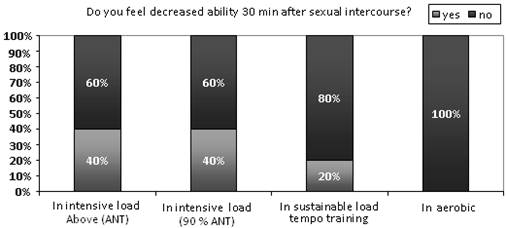
Graphic 2 The effect of sexual intercourse on the sustainable load 30 minutes before the various intensity loads
12 hours after sexual intercourse none of the long distance runners register complete weakness, waste of energy is reported in just 6,45 %, and decreased coordination is reported in 6,45 % of long distance runners (Graphic 3). Increased tension is not reported at all but overwhelming relaxation is felt in 38,7 % of the long distance runners. We do not register weaker concentration even 12 hours after the sexual intercourse.
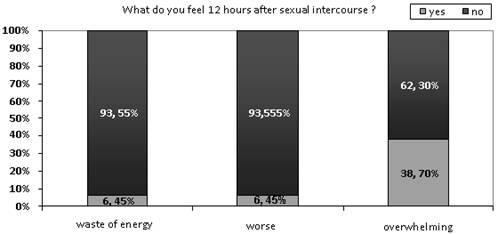
Graphic 3 Change of subjective feelings in sustainable loads 12 hours after the sexual intercourse
30 minutes after the sexual intercourse in load 40% of our subjects feel complete weakness, 45,2 % feel lack of energny. Worse coordinatiod in n is reported in 54,8 % of the long distance runners (Graphic 4). Disturbed concentration is noticed in 40% of our subjects
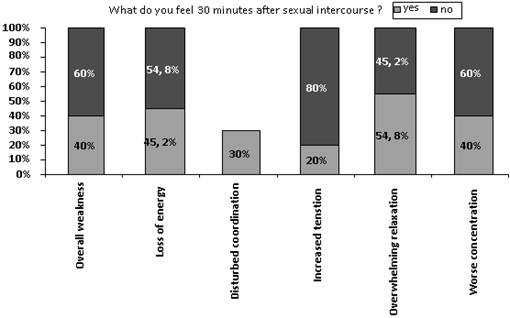
Graphic 4 Change of subjective feelings in sustainable loads 30 minutes after the sexual intercourse
Each of the observed long distance runners had sexual intercourse 12 hours before the competition and 16,13 % of them reported positive influence on their performance and obtained results, nobody reported negative feelings about this experience and attributed negative influence on their results while 83,87 % of them think that sexual intercourse did not exert any type of influence on their performance (neutral influence). Only 14,5 % of the observed long distance runners had sexual intercourse 30 minutes prior to competition and 1/3 of the subjects think sex has negative influence on the achievement of results while 2/3 think that sex did not influence the results of the competitions. 9,7 % of long distance runners do not have sexual intercourse 12 hours before the competition while 62,3 % of them refrains from sex 30 minute before the competition. It is understandable that a sexual intercourse 30 minutes long is hard to obtain, and one of our subjects think it even impossible but let us remind that 14,5 % of our subjects underwent such experiences.
We have also observed the load the very sexual intercourse put on our subjects and have concluded that this activity is aerobic, mainly small and medium intensity which depended on the the type of intercourse. Values of lactates measured right after the intercourse are 2,2 to 3,6 mmol.l-1, and maximal values of heart rates go to 140 p.min-1. A group made up of 6 long distance runners was observed for the changes in heart rates in loads ensued 48 after the sexual intercourse, 30 minutes and 12 hours after the sexual intercourse. Differences in average values of heart rates in aerobic loads lasting to 1 hour (rhythm ± 0,9 s / km) were minimal. Also load with heart rates to the limit of 136 p.min-1 was observed. Difference between these heart rates was 0,2 p.min-1 which is a neglectable value for sport.
Similar situation occurred with the load with the intesity of tempo lasting to 2 hours (rhythm ± 0,5 s / km). Heart rate reached average value of 153 p.min-1, where the difference ranged from 0,4 p.min-1. These differences are also insignificant regarding sports.
Difference was noticed in the loads of higher intensity (in rhythm intensity of 95 % of ANT in standard circumstances). In loads longer than 4 minutes average heart in loads 48 hours after the sexual intercourse, i.e. 12 hours after the intercourse reached 3,9 p.min-1, i.e. 3,5 p.min-1 higher values whereby subjective feelings did not change during loads. Only in loads 30 minutes after the sexual intercourse some weakness was felt but without negative influence on the realization of load.
The biggest difference was notices in the loads of varied intensity known as fartlec training where observed long distance runners realized tracks of 200m of high intensity with the changes of 200m lower intensity and thus 4km in the rhythm that corresponded to the value of the average heart rate on the limit of ANT (in standard circumstances). Again the smallest average heart rate in loads after 30 minutes upon sexual intercourse was registered and that 4,5 p.min-1, i.e. 6 p.min-1, where there were no significant changes in subjective feelings. Only subjective feeling of decreased muscle tone was regitered and it minimaly disturbed the coordination in the first kilometer.
CONCLUSION
Our research proves that all long distance runners do not respond equally after being exposed to sexual intercourse in terms of their performance whereby more than 90 % of the observed subjects accented that sexual intercourse 12 hours before the load would not have negative influence on the obtained results. Almost half of the observed subjects noticed change in muscle tension 30 minutes and 12 hours aftet the sexual intercourse. It is important to emphasize that 12 hours after the sexual intercourse only quite relaxing feeling is reported while 20 % long distance runners felt increased muscle tension 30 minutes after sexual intercourse. Even 40 % of the subjects felt worse feeling in loads of high intensity 30 minutes after the sexual intercourse but such activity of the body causes lower heart rates. In aerobic load of lower intensity there were no changes of subjective feelings and heart rates. Sexual intercourse 30 minutes before the load (training or competition) is practiced by 1/6 of long distance runners whereby 1/3 of them noticed the achievement of worse sports results after such activities. Majority of athletes agrees that sexual intercourse 12 hours before the load will not cause negative effects on the performance. It is to be concluded that it is not quite possible to determine whether sexual intercourse before the load exerts positive or negative influence on the achievment of results.
REFERENCES
-
Anderson, P. B., Wei, P. & Shyu, I. (2001). The Relationship Between Sexual Activity (and Four other Health Behaviors) and Marathon Performance Among Non-elite Ru nners. In: Electronic Journal of Human Sexuality, Vol 4.
-
Boone, T. & Gilmore S. (1995). Effects of sexual intercourse on maximal aerobic power, oxygen pulse, and double product in male sedentary subjects. Journal of Sports Medicine and Physical Fitness, 35(3), 214-217.
-
Boynton, P. (2004). In: Sex u sportovců může pomoci, ale i uškodit. www.bbcczech.com
-
Douglas, J. (2007). In: Sex noc před zápasem prý sportovní výkon neohrozí. www.novinky.cz
-
Fisher, G. J. (1997). Abstention from sex and other pre-game rituals used by college male varsity athletes. Journal of Sport Behavior (JSB),20(2), 176 - 184.
-
Mikulová, E. (2003). Telovýchovný lekár Pavel Malovič odporúča sex pred športovým výkonom. In: Korzár.
-
McGlone, S. & Shrier, I. (2000). Does Sex the Night Before Competition Decrease Performance. Clinical Journal of Sport Medicine, 10(4), 233-234.
-
Trojan, O. (2006). Sportovcům může k medaili pomoci sex. In: iDnes.
UTICAJ SEKSUALNIH AKTIVNOSTI NA IZDRŽLJIVOST I SPORTSKE PERFORMANSE
Sažetak
Ovaj rad pokušava da rasvetli problem percepcije seksualnih aktivnosti sportista dugoprugaša pre izlaganja fizičkom opterećenju. Grupa koja je odgovarala na pitanja iz upitnika činila je 62-oje brzih hodača i dugoprugaša iz 6 evrospkih zemalja, starosti 32±8 godina. Upitnik je bio sastavljen od 8 pitanja zatvorenog tipa sa još dodatnim pitanjima. Više od 90% ispitanika pretpostavlja da upražnjavanje seksualnih aktivnosti 12 časova pre izlaganja naporima nema uticaja na kvalitet sportskih performansi. 40% ispitanika koji su se takmičili odmah nakon upražnjavanje seksualnih aktivnosti su prijavili loše raspoloženje tokom izlaganja opterećenju. Kada su u pitanju aerobna opterećenja nema prijavljenih loših osećanja ili promene srčanog ritma kod ispitanika. Tako da ne možemo sa sigurnošću tvrditi da upražnjavanje seksualnih aktivnosti pre izlaganja opterećenju ima pozitivan ili negativan uticaj na kranje performanse sportista.
Ključne reči: seksualni odnos, opterećenje, srčani ritam, pitanje
Correspondence to:
Miodrag Kocić, PhD
Faculty of sport and physical education,
University of Nis, Serbia
Čarnojevića 10A,
18000 Niš, Serbia
E-mail: kocca@eunet.rs